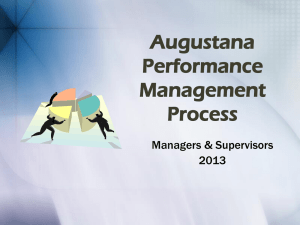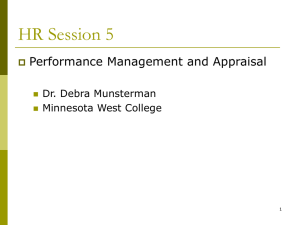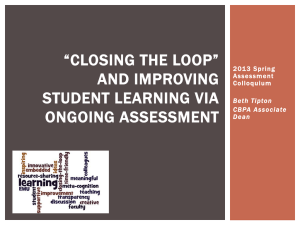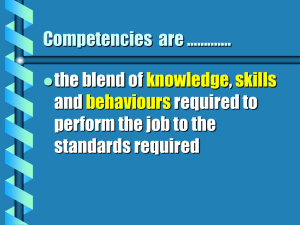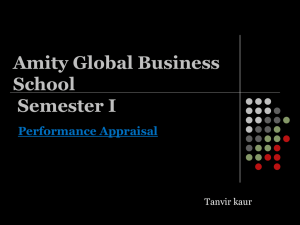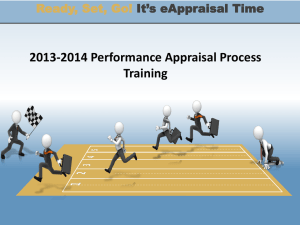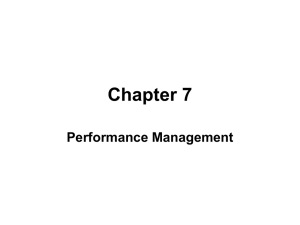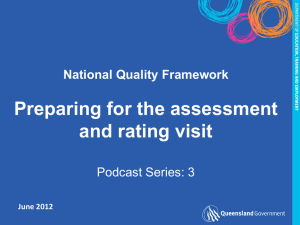Performance Appraisal System 2007 Slide Presentation
advertisement
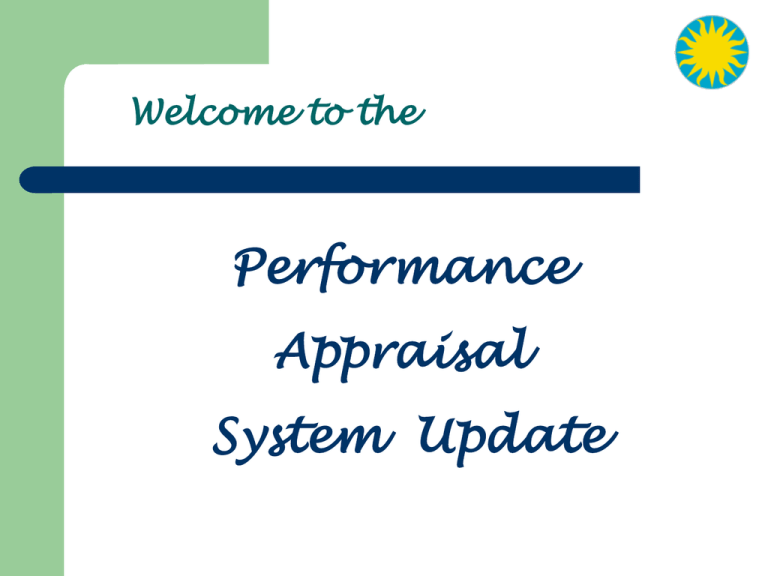
Welcome to the Performance Appraisal System Update Purpose To present and explain changes to the Smithsonian Institution’s Performance Appraisal System by focusing on Four Key Messages For copy of slides and related documentation: http://ohrweb.si.edu/docs/pm.htm Key Message One: We are Changing the Performance Management System to Ensure that the Smithsonian Institution Excels in Achieving its Mission: Create a results oriented performance culture that helps employees understand and carry out their role in the achievement of the organization’s strategic goals Create a process for managers and employees to receive accurate and constructive feedback on their performance in order to develop the skills and knowledge needed to successfully excel in carrying out their assignments and responsibilities Key Message One Impact Allows individual units to establish milestones and measures to track their progress on program performance goals that contribute toward achievement of the Institution’s mission and strategic goals Holds supervisors accountable for administration of the Performance Appraisal System by basing their rating on how successful they are in completing the plans of their employees Clearer understanding of how an employee’s effort contributes to the achievement of unit and Institution’s strategic goals Key Message Two: All Elements of Performance Plans Must Link to the Smithsonian Institution’s Strategic Goals Goal 1: Increased Public Engagement: Diffusion of Knowledge: Enlarge the Smithsonian’s audience and improve the quality of its impact on its audience Goal 2: Strengthen Research: Increase of Knowledge: Pursue scientific advances, discovery, and scholarship in the natural and physical sciences, arts, humanities, and social sciences Goal 3: Enhanced Management Excellence: Modernize management systems by bringing each of them to a level of quality and sophistication appropriate to an organization of the size and complexity of the Institution Goal 4: Greater Financial Strength: Provide financial support essential to achieving the Institution’s goals Key Message Two More about Performance Plans Elements of Performance Plans describe primary duties Elements are appropriate to description and level of position Non-critical elements are no longer in Performance Plans Plans reviewed annually to note any changes in element expectations Plans include measures or standards that are credible, achievable, and fair Plans clearly describe the Successful level of performance Managers are encouraged to also write a description of the Outstanding level of performance All manager and supervisor plans include an element addressing managerial or supervisory responsibilities, including accountability for the performance of their employees Key Message Three: Accurate and Fair Appraisals Help Ensure High Performance Employee appraisals are used as a basis for Recognizing top performers Identifying developmental needs Identifying and addressing deficiencies in performance Key Message Three Linking plans to goals and creating more measurable standards will result in the following: “Successful” level seen as a positive rating Employees will receive feedback that will lead to growth in job-related skills Increased motivation to perform at higher level Poor performance will be addressed Increased morale based on realistic ratings and connection to Smithsonian goals Key Message Four: System provides for formal and informal communication between employees and supervisors throughout the year Employees are involved in the development of their Plans Employees must receive at least one progress review during the performance appraisal period If at any time during the rating cycle an employee’s performance on any element is in danger of falling below the Successful level, the rating official must take remedial action to assist the employee in improving his/her performance Unit performance expectations are communicated through performance plans and employee ratings impact overall unit performance Management exercises accountability and oversight for individual and organizational performance Key Message Four Performance Rating System Changed to Four Rating Levels Successful: Meets Expectations Highly Successful: Frequently Exceeds Expectations Outstanding: Consistently Exceeds Expectations ********************************************************************* Unacceptable: Does not perform at acceptable level on one or more elements Key Message Four Successful—Meets Expectations Tasks and accomplishments are completed in a successful manner and reflect considerable skill and efficiency Timeframes are met or occasionally exceeded. Accomplishments directly contribute to meeting organizational goals. Key Message Four Highly Successful—Frequently Exceeds Expectations Tasks and accomplishments are often completed in advance of timeframes. Due to the individual’s initiative and foresight, accomplishments regularly extend beyond the described element or assignment and significantly contribute to exceeding organizational goals. Key Message Four Outstanding--Consistently Exceeds Expectations Performance requirements are consistently surpassed and completed in advance of timeframes. Due to individual’s leadership, initiative, and/or creativity, accomplishments consistently extend beyond the expected outcomes and results. Accomplishments have a direct and significant impact on exceeding organizational goals and establishing new directions, priorities, or work processes Key Message Four Unacceptable Does not perform at acceptable level on one or more elements Appraisal Process Appraisal period begins October 1 and ends September 30 of the following year The supervisor rates each performance element based on the level of accomplishment Ratings reflect consistent performance of standards Each of the four performance levels is assigned a weight of 0-3 The average weight of all elements is the summary rating, unless any element is rated “Unacceptable” If any element is rated “Unacceptable”, then the summary rating must be “Unacceptable” regardless of numeric average Summary Rating Example Numeric value of ratings 0 – Unacceptable 1 – Successful 2 – Highly Successful 3 – Outstanding Summary Conversion Table 1.0– 1.5 = Successful 1.6– 2.5 = Highly Successful 2.6– 3.0 = Outstanding Employee receives the following appraisal: Performance Element #1 – Successful (1 point) Performance Element #2 – Highly Successful (2 points) Performance Element #3 – Highly Successful (2 points) Performance Element #4 – Successful (1 point) Numeric score is 6. This score is divided by the number of performance elements (4) which gives the summary rating of 1.5. This converts to a summary rating of Successful. Development Requirement As part of performance summary Rating officials must note at least two constructive suggestions or strategies to assist the employee in enhancing current performance or reaching new goals. This can include identifying goals for individual development or milestones for potential career growth Employee Responsibilities Participate in the development of their Performance Plan Perform assignments in a skillful and efficient manner Seek opportunities to enhance skill and knowledge Stretch to perform at higher levels Supervisor Responsibilities Include employee in the development of their Performance Plan Provide specific and fair feedback based on the performance standards Provide employees with opportunities to enhance skill and knowledge Encourage employees to stretch to perform at higher levels Frequently Asked Questions Q: How will the changes affect Cost-of-Living, Within-Grade, or Quality Step increases? A: All employees will receive a Cost-of-Living increase. Within-Grade increases will be approved if an employee’s performance is Successful or above. Quality Step increases require that the most recent rating of record is an Outstanding Frequently Asked Questions Q: How will the changes affect Cost-of-Living adjustments and Merit Salary Increases for Trust employees? A: Trust employees will receive the Cost-of-Living adjustment as approved by the Smithsonian. Employees will be eligible to receive Merit Salary Increases based on a rating of Successful or above and the availability of funding. Two step Merit Salary Increases require that the most recent appraisal rating is an Outstanding Frequently Asked Questions Q: How will Performance Awards be affected by these changes? A: A Performance Award is a one-time lump sum cash award based on an employee’s performance and may be given to an employee whose summary rating is at the Highly Successful level or above Frequently Asked Questions Q: What happens if an employee’s performance falls below acceptable? A: If at any time during the performance cycle, the supervisor determines that the employee’s performance is unacceptable for any element, a Performance Improvement Plan (PIP) must be prepared and communicated to the employee. The PIP must allow 30 days for the employee to demonstrate acceptable performance. Frequently Asked Questions Q: How will I be evaluated for 2006 A: Employees will be evaluated using the performance plan that was established in the outgoing performance appraisal system. Frequently Asked Questions Q: When will the Performance Plans for 2007 be due? A: Supervisors are responsible for having the 2007 Performance Plans in place within 60 days of doing the 2006 appraisal. Next Steps Half day training workshops will be offered to all supervisors throughout the Smithsonian Institution beginning in October. For further information on performance management: http://ohrweb.si.edu/docs/pm.htm Summary Changes to the Performance Appraisal System will help ensure the Institution achieves its mission Performance elements link to Strategic Goals Clear measurable standards and accurate and fair appraisals help ensure high performance Employee-Supervisor communication is critical to a successful implementation of these changes Any Questions? Please Complete the Evaluation Form - Thank You
